Teachers: Maths and Sciences
Mathematics and Sciences were studied by all Wellingtonians in varying degrees, and a great number had enduring memories of the teachers involved. Many of these focus on teacher idiosyncracies or student misbehaviour, while some describe teachers who were liked, respected, or occasionally, simply feared.
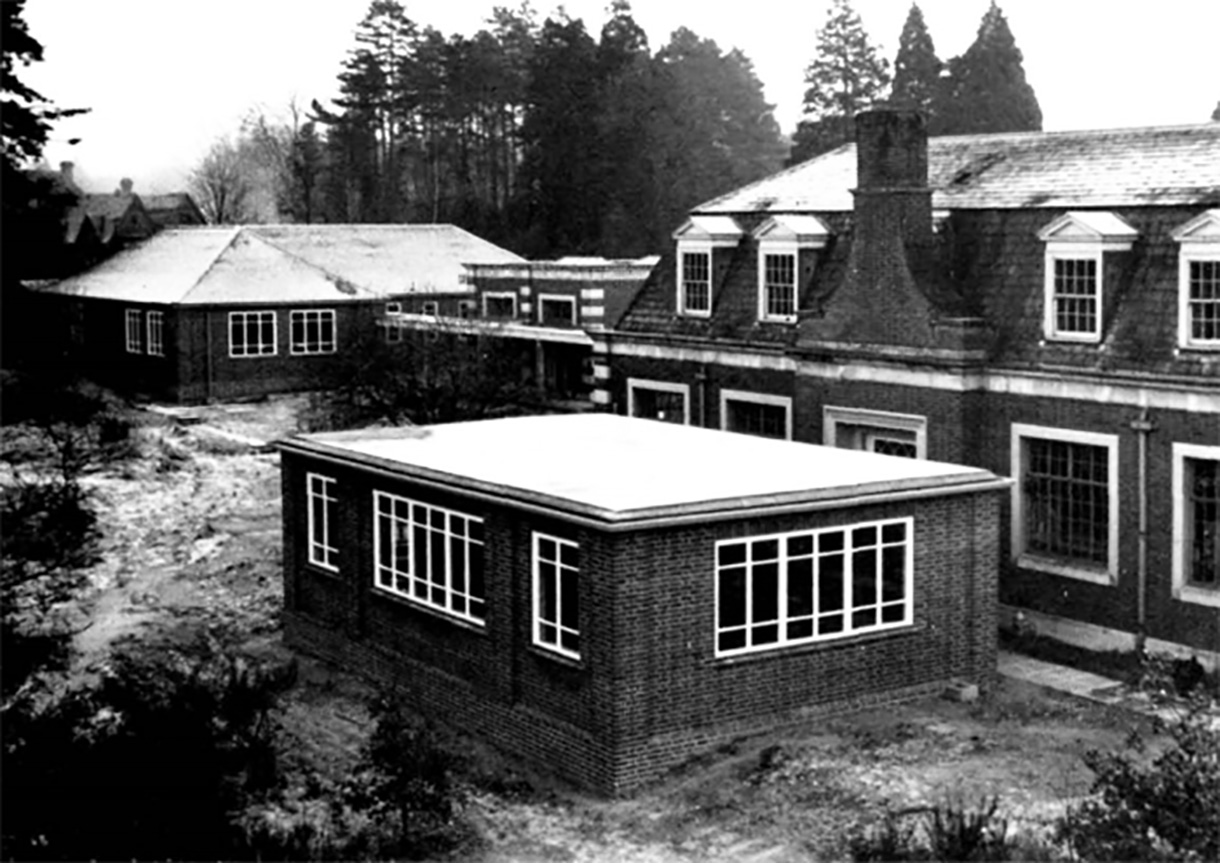
Mathematics
Sadly, Wellington Maths teachers of the 1940s seem to have been remembered more for their weaknesses or peculiarities than their teaching ability. The first of these, Mr Morris, had almost certainly been brought out of retirement to teach during the War, and his students naturally took full advantage:
‘Mr Morris for Maths in “Siberia.” He was small, pink, silver-haired, balding, neat, semi-blind, old and frightened. It seems he also lacked the sense of feeling. Approaching his desk from a flank, we would seek his interpretation of some piece of algebra contained in our text books. While he gave us his guidance, we would place small pieces of foolscap on his thinning pate. He felt nothing and eventually, when his crown was complete, we were so convulsed with laughter that he had to dismiss us.’ Robert Waight (Orange 1942-46)
After the war another teacher, Major Roy, still felt its effects:
‘He had a glass eye. And the trick, when being taught by him, was to sit on the side of the classroom that was virtually invisible to him.’ Murray Glover (Anglesey 1947-51)
‘I studied Maths under Major “Hosh” Roy, who also ran the CCF. Sadly he had lost an eye, I believe in WW2, but he did not have his glass eye in. As is well known, schoolboys can be very unkind. We found that if the sun was shining from the right direction, one could use a protractor to flash it on his blind eye socket, which would then tickle him. However, if you were too slow when he moved his head and he saw what you were doing, it would inevitably lead to detention at the very least.’ Richard Craven (Hill 1950-54)
Nick Harding (Combermere 1951-1955) recalled another unusual teacher: ‘One lesson a week for at least one year, was memorable. I forget what it was meant to be about but all that happened was that the usher, a Mr Lewis, read us a book, usually about the Sahara which he was interested in. We were not required to listen but were permitted to sleep. Curiously, we weren’t allowed to read though one did, covertly.’ A little research suggests that this was R H Lewis, a Maths teacher who went on to spend most of his career as an educator in Nigeria.
However, most of those at Wellington in the 1950s had good memories of their Maths teachers, men who the students felt had worked hard and communicated their subjects well:
‘Gethin Hewan rendered calculus and trigonometry facile so that even a not very mathematically minded chap like me could comprehend. He was charismatic, hugely good looking, an incredible ball player and, I am sure, a captivating leader.’ David Nalder (Orange 1949-53)
‘Favourite subject by far: Maths, with “Bloss” Parkes.’
Roger Pinhey (Hopetoun 1952-57)
‘Another master I appreciated was A Potter, whose method of teaching me Maths really clicked and turned Maths from a mystery to a cinch for me.’ Graeme Shelford (Hardinge 1954-57)
‘Mr Borradaile laboured mightily to get me through O Level Maths, geometry, etc.’ Tim Travers (Hopetoun 1952-56)
Several teachers received multiple plaudits, for example Mr Buckley:
‘Mr Buckley, who taught senior Maths, was a real father figure, a really lovely man. His strongest form of disapproval, and one that we tried hard to avoid, was to put the miscreant’s name on the side of his blackboard under the title “P P of D”, short for “Perishing Path of Defaulters”, where it would stay until redeemed.’ Peter Gardner (Hardinge 1946-51)
‘Buckley kindled my interest in Mathematics, as he did for many of my fellow students, with a gentle and humorous way of telling us we had the wrong answers; correct answers entered your name on the left-hand side of the blackboard as one of those on “The Primrose Path of Duty”- wrong ones went on the other side of the board only if they were really seriously wrong. Combined with simple and lucid explanations of the difficult bits, I can’t remember any of my fellow students who didn’t enjoy his classes and also hold him in high regard as a person.’ John Berger (Benson 1949-52)
‘For one brief lesson, I think, I was taken for Maths by Buckley. I could understand why he had a reputation as a brilliant teacher. I think he died shortly afterwards.’ Douglas Miller (Benson 1951-56)
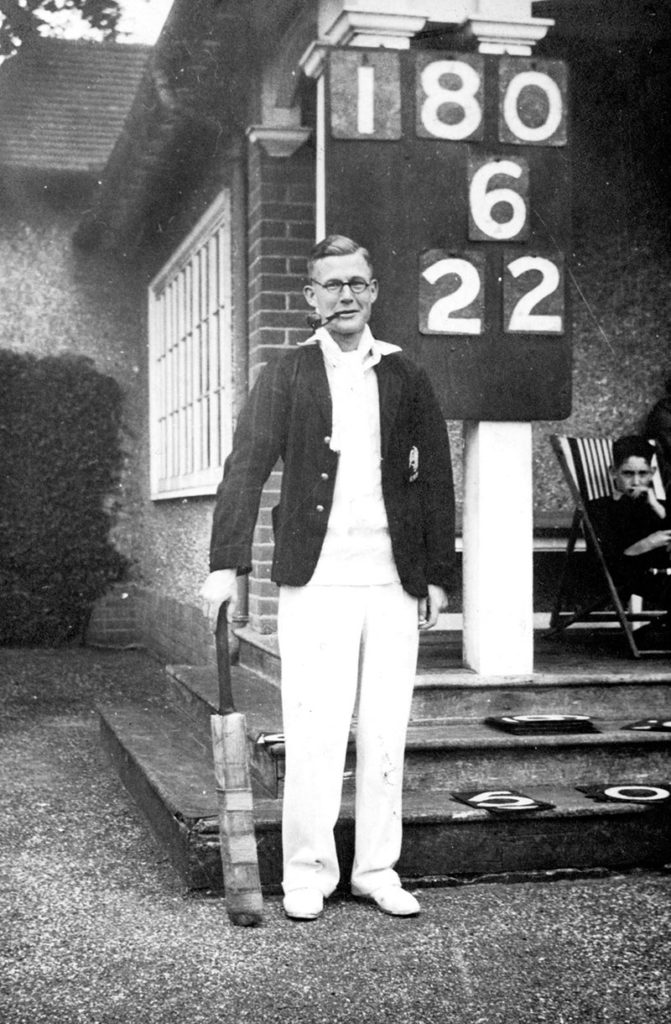
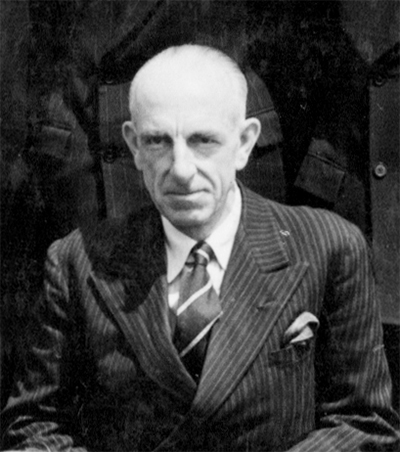
Mr Evans’ perseverance with struggling students was remembered by several:
‘The outstanding teacher for me was “Nosey” Evans who got me through O Level Maths.’ Nigel Hamley (Hill 1952-55)
‘Somehow Evans got me through O Level Maths by one mark. I am still hopeless at it.’ Martin Kinna (Murray 1953-58)
‘Maths was a weak subject of mine and for a term or two I was moved to the “B side” for the subject. Mr Evans somehow managed to turn my worst subject into one in which to the surprise of many, not least myself, I even scraped an O-Level pass in something called Additional Maths.’ Neil Munro (Talbot 1952-56)
Although at the end of his career he could appear somewhat distant:
‘Mr R G Evans, Senior Assistant Master and nearing the end of a long career at College, was noting down the results of a Maths test in his book. One boy announced a particularly poor score, and this was duly recorded. Mr Evans showed no emotion but began to turn back the pages of his book. Eventually he found what he was looking for and directed his gaze at the offending pupil. “Your father wasn’t very good at Maths either,” he said, and without further ado carried on recording the test results.’ Anonymous (1957-60)
Likewise, Mr Macdermott was remembered for an idiosyncracy as well as his teaching ability:
‘I do remember my Maths teacher Macdermott who, while introducing us to the intricacies of calculus, was an expert shot with a piece of chalk to wake up any slackers.’ Robert Hirst (Picton 1955-59)
‘For Maths, dear old Mr Macdermott was without doubt a first class teacher who, in retrospect, had a very deep understanding of teenage boys and how to get the best out them. It was of note that the only A Level I achieved was that in Pure Mathematics.’ Jerry Yeoman (Anglesey 1955-59)
‘One valuable piece of advice I received from Mr Macdermott was “THINK BEFORE YOU WRITE!” I still have to say this to myself quite regularly!’ Tony Glyn-Jones (Picton 1954-59)
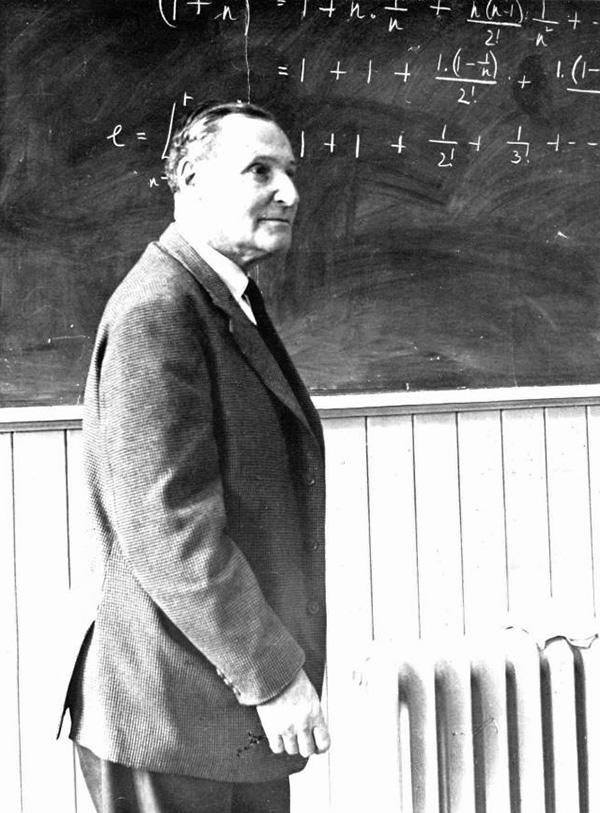
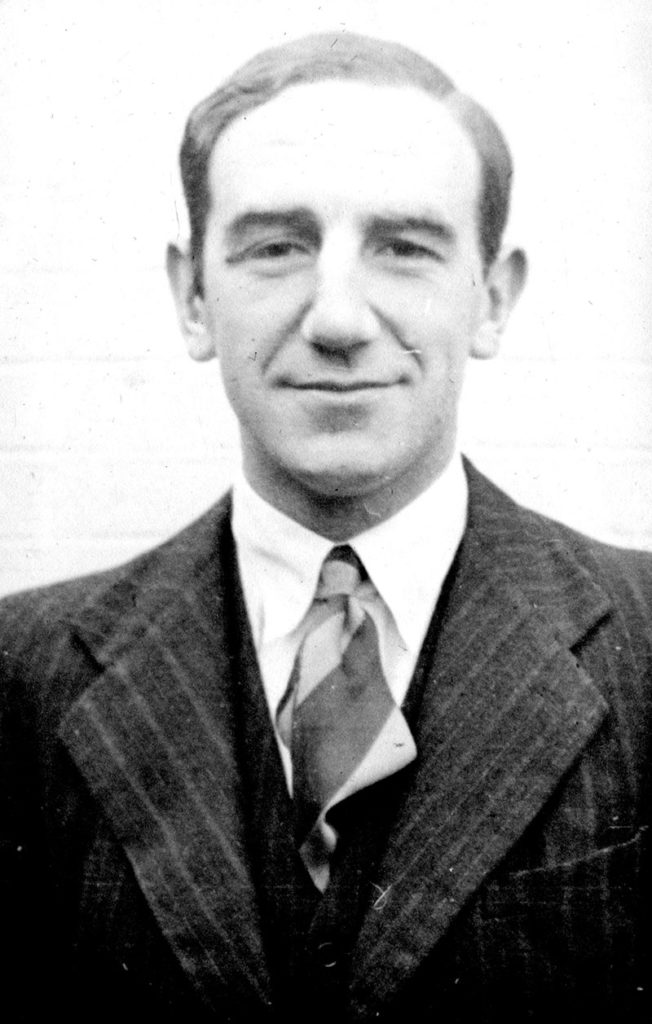
And the Maths teacher who received most praise was James Wort:
‘My favourite subject was Maths, taught by James Wort who I thought was a good teacher.’ Anonymous (1951-56)
‘Jack Wort taught me Maths and I got 98% at O Level. I don’t know who was more surprised.’
Bertram Rope (Picton 1949-54)
‘I admired Jack Wort greatly for he succeeded in coaching a very thick young Scottish boy into being able to pass the Army exam and join his father’s and grandfather’s regiment The Black Watch. I was extremely slow and often had an extra ten minutes with him of “private tue.” As the Army exam approached, he told our class, “Bearing in mind the examiner will be marking many papers in the day, try to interest him a bit with your paper. I will give you a tip, if asked for a diagram in algebra, geometry or even Maths, see if you can get out a red crayon or even other colours and illustrate your theory in colour – I bet it will cheer him up and you might get the benefit of the doubt in some cases!”’ Colin Innes (Combermere 1949-54)
‘James Wort stands out as the best of the few Maths teachers I had. He had a philosophy that whatever one was doing it was best to get it done quickly, because life had so much else to offer to which you could then devote your attention.’ Douglas Miller (Benson 1951-56)
Physics
Like the Mathematics teachers, many in the Physics Department also seemed to have been affected by their war service – in some cases, the First World War:
‘My earliest form teacher was Mr Tancock, nicknamed Tin John owing (reputedly) to his buttocks having been shot off during the Great War and replaced by a Bakelite prosthesis. This was backed up by the claim that if you put a drawing pin on his seat he would not feel it. This claim was never put to the test. His teaching was forgettable, except for one morning when he brewed us mate tea.’ Peter Gardner (Hardinge 1946-51)
In fairness, the ownership of a ‘Bakelite bottom’ was attributed to a succession of Wellington teachers over the years, including German teacher Mr Braunholz, and later, Peter Comber. Perhaps we shall never know the truth.
Another teacher affected by the war was Mr Strachan, who may well have been the Physics teacher described by Royer Ryall in the Academic Expectations section. John Green (Talbot 1954-58) wrote about ‘Rexie Strachan, whose nerves had been shattered by war, whom we would, meanly, shock by dropping books from height in his Physics class.’ Nevertheless, Michael Southwell (Orange 1955-60) recollected that ‘Mr Strachan (Physics and Maths) was very good.’
By contrast, Robert Moss was obviously accorded respect for his recent and interesting war service, and also for his teaching:
‘Bobby Moss for science and his talks about the sinking of the Bismarck when he was in a shadowing cruiser’s Ops Room.’
Tim Reeder (Picton 1949-53)
‘Another highly respected usher was Mr Moss, a Physicist and Tutor of the Orange, who had been in the navy during the war and, it was said, as a radar whizz kid, had been the officer who located the Bismark after she had sunk HMS Hood.’ Anonymous
Robert Moss, a holder of the Polar Medal and Royal Navy officer. He became my Tutor, mentor, and saviour.’ Robert Waight (Orange 1942-46)
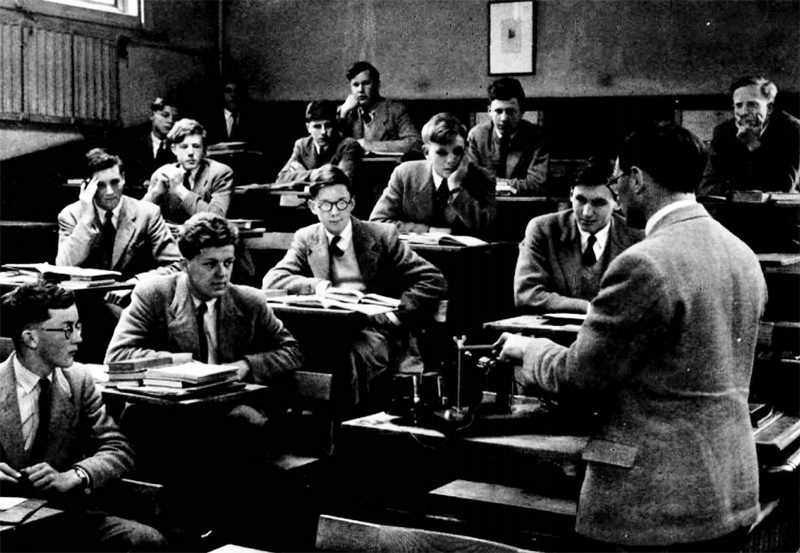
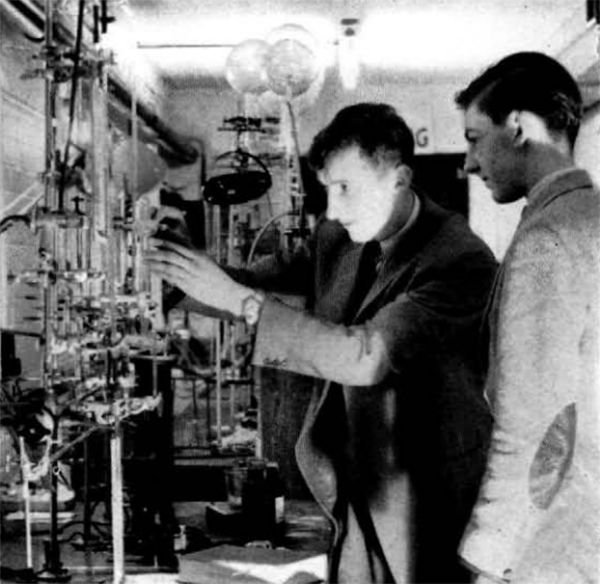
Chemistry
Two Chemistry teachers stood out within our responses, both generating a large number of recollections.
The first of these was B C L ‘Bertie’ Kemp:
‘Chemistry – B C L “Bertie’ Kemp – “Kempistry.” Experiments – clouds of smoke – “Hmmm…” from somewhere in the smoke cloud – reputed to have a strong right arm if one incurred his wrath sufficiently to merit a beating (I managed to avoid doing so).’ Charles Ward (Hopetoun 1951-55)
‘Bertie Kemp succeeded in all of us looking forward to his classes because he was adept at making chemicals spectacular – not least on Guy Fawkes Day. The most memorable November 5th for me (and my peers) was the one when he combined two very small amounts of chemical in a test tube while he explained that the reaction between them would take, as I remember it, some eight seconds and would be fairly violent, so he proposed to count to five and throw the test tube out of the door. He did – and it was. So violent indeed that it blew in most of the windows in our laboratory and some of those in several others.’ John Berger (Benson 1949-52)
‘B C L Kemp wrote Chemistry for Schools, the Chemistry text for the national high school curriculum. We were fortunate to have him as our Chemistry master.’ Peter Rickards (Murray 1947-52)
‘In one of his lessons where we had his Chemistry book as our text book, I recall he was describing some details when one boy put up his hand and said, referring to his book, “Sir, it says here…” He got no further; Mr Kemp came up to him, grabbed him by the ear and said, “My boy, do not refer to me as “it.”’ Richard Craven (Hill 1950-54)
‘Bertie Kemp’s teaching technique was unique and highly effective. His Chemistry classes, sitting in the tiered format of the laboratories, were classified in descending order as wizards, average boys and bim boys. During his lessons he would shoot questions at the class to be answered in succession by the boy whose turn it was. If he failed to provide the correct answer, the question passed to the next boy down. This went on till a boy answered correctly, when he would move up the ranks taking the place of the original boy questioned, while he and all those who had failed in their answers moved down one place. At the end of each period the order of merit was entered in the register. If, say, there were twenty boys in the class, the one who had ended up top, known as the senior wizard, would get twenty marks, while the one at the bottom, known as the bim boy, would get one mark. This system kept everybody thoroughly alert, and proved a remarkably accurate method of judging merit over a protracted period.
Bertie was also responsible for arranging the highly complex teaching programme whereby six hundred boys, on a wide variety of courses, were each allotted classrooms throughout the term, and that no usher found himself down to teach two classes simultaneously. It must, before the days of computers, have presented an awe-inspiring mathematical jigsaw. I was very saddened when I heard of Bertie’s death; he had been an inspiration and a friend.’ Hugo White (Hardinge 1944-48)
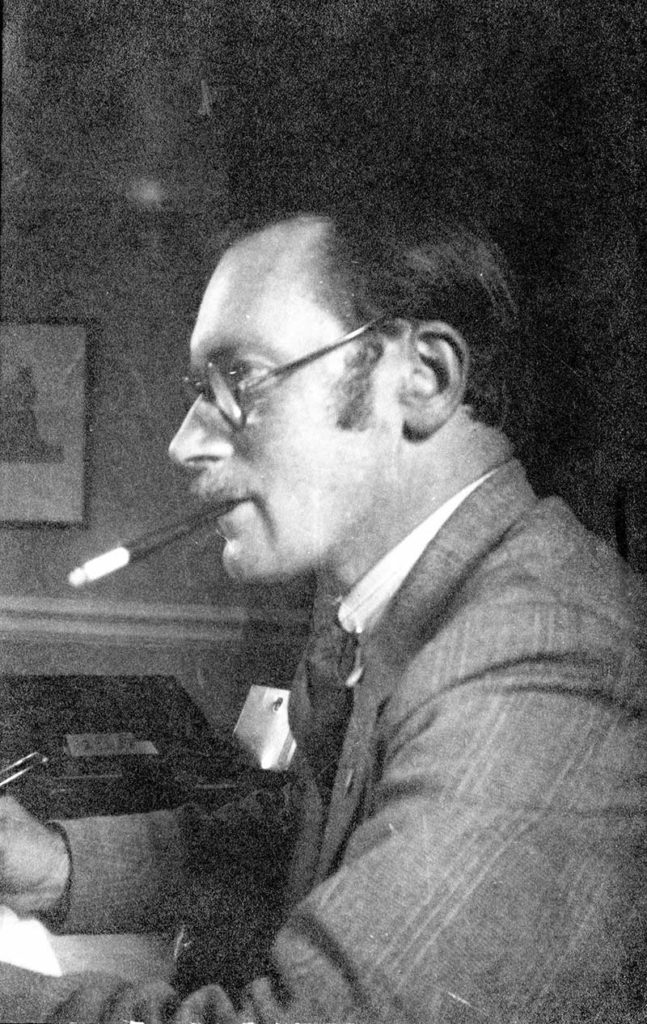
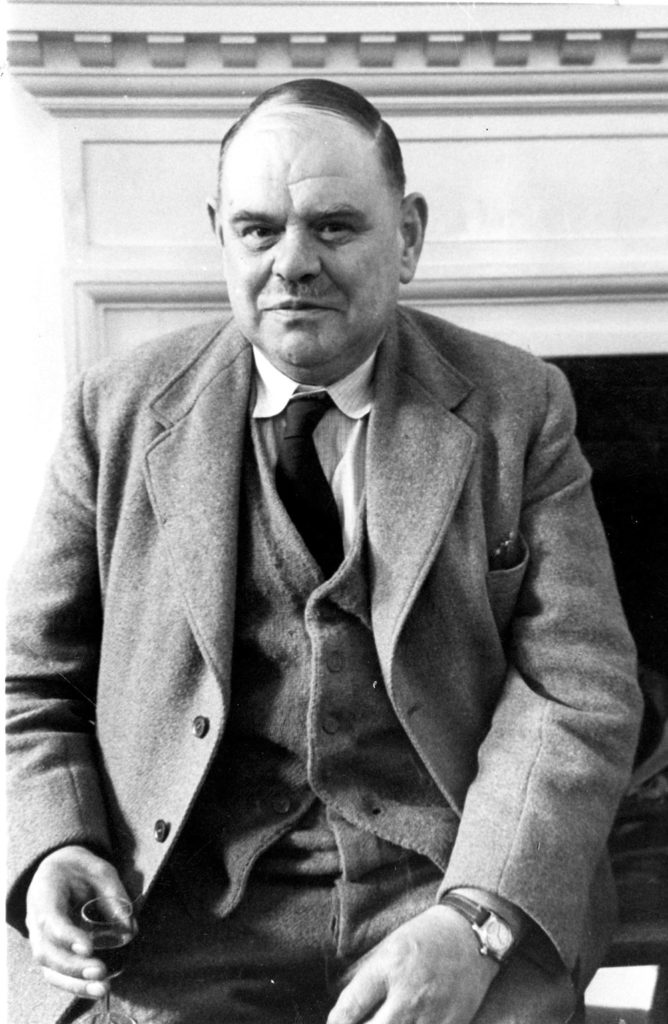
The second well-remembered master, clearly a man to be reckoned with, was Major Mackenzie:
‘The one who stood out for me was Major Mackenzie. He was an artillery officer in WW2 but had been badly wounded. As a consequence, he had to use two walking sticks when moving around. He was my Chemistry teacher in my last term at Wellington. There were only a few people in the class and I think many of us were just killing time before having to report for our National Service. Anyway, at the start of the course Major Mac asked what would we like to study? “Explosives” was the universal reply! So we did. I remember nothing about the course until one day, the Major was late getting to the class. While waiting for him, we got together and started to manufacture guncotton, which is easy to do. As part of the process, we had to allow a liquid to evaporate at some point before the guncotton becomes ‘live’. So, to put it out of harm’s way, we placed our sample on the top shelf of a cabinet to let it do its thing.
When Major Mac eventually arrived, he asked what we had been doing? “Making guncotton, Sir,” we replied. I can tell you that a man with two sticks can move amazingly quickly when motivated. The Major raced to the shelf, retrieved the evaporation dish and threw it out of the door. While we certainly got a stern talking to, we never got beaten, thank God.’ Chris Heath (Beresford 1948-53)
‘Major Mac who taught Chemistry, and having been gassed himself in WW1 saw no reason why we shouldn’t suffer. The diffusion of gases was clearly demonstrated by pouring nitric acid into large beakers filled with copper chips, and then watching us evacuate the lab.’ Michael Peck (Anglesey 1954-59)
But it was Major Mackenzie’s dog which really gained legendary status:
‘Another usher who we greatly respected was “Major Mac” Mackenzie, who, it was said, had smothered an exploding grenade with his body in the trenches and suffered fearful injuries. He was in the Royal Artillery and had a slobbering dog called Gunner; I think he was a bulldog and used to accompany Major Mac to his classes where he would pant and break wind throughout the session to our great amusement.’ Anonymous
‘Major Mac always brought his dog, Gunner, into class with him. Being not too dexterous, he would frequently drop chemical and evil liquids on the floor, whereupon Gunner would lap them up avidly. Given this lead, when at the benches, we used to amuse ourselves by giving the dog a varied diet of highly suspect laboratory substances. Gunner seemed to survive the lot.’
Peter Gardner (Hardinge 1946-51)
Not, sadly, according to a subsequent student:
‘Major Mackenzie was very polite and treated the boys with great formality. He was followed everywhere by a white bull terrier with red eyes, called Rover, who was introduced to each new set in turn: “Boys, I want you to meet Rov-ah!”’
‘Major Mackenzie was given to performing Chemistry demonstrations on the bench in front of the class. Being unsteady on his feet he would, from time to time, drop reagents on the floor. When this occurred, the hapless Rover would leap out from underneath the bench and lap up whatever was available. Remarkably, he never came to any harm until the day Major Mackenzie dropped a whole flask of concentrated sulphuric acid. Rover, seizing his chance, imbibed the lot and died horribly in front of the whole class. Luckily, I did not witness this as it occurred in front of another set.
‘Poor Major Mackenzie was heartbroken. He was very crestfallen for the rest of the term. We returned the following term to be greeted by a much-cheered Major Mackenzie accompanied by a brindle bull terrier. “Boys, I would like to introduce you to Rang-ah!”’ Roger Ryall (Picton 1951-56)
Although, as Roger did not witness this incident himself, we can only hope that it was greatly exaggerated.
Lastly, Dr Waddington, who came to Wellington in the later 1950s, made a strong impression on one student:
‘Waddington beat my friend and me for putting a papier-maché dog turd in his desk drawer.’
Michael Trevor-Barnston (Anglesey 1957-60)
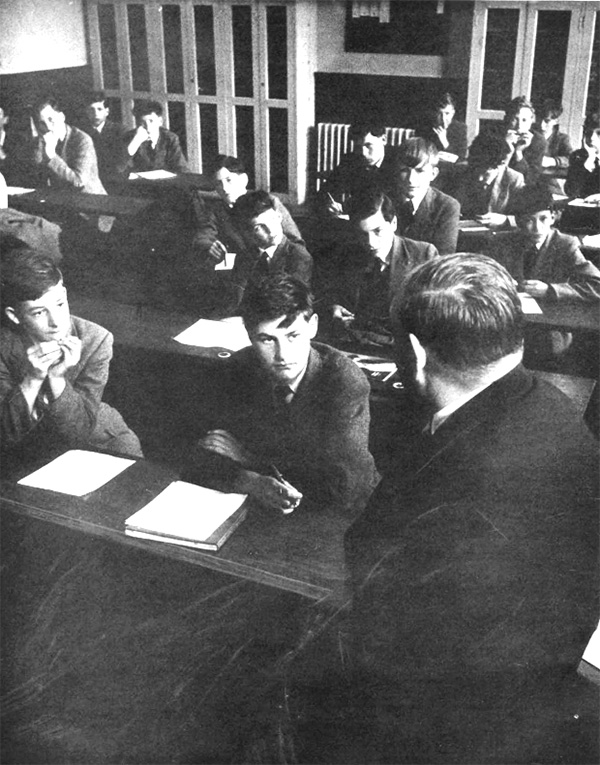
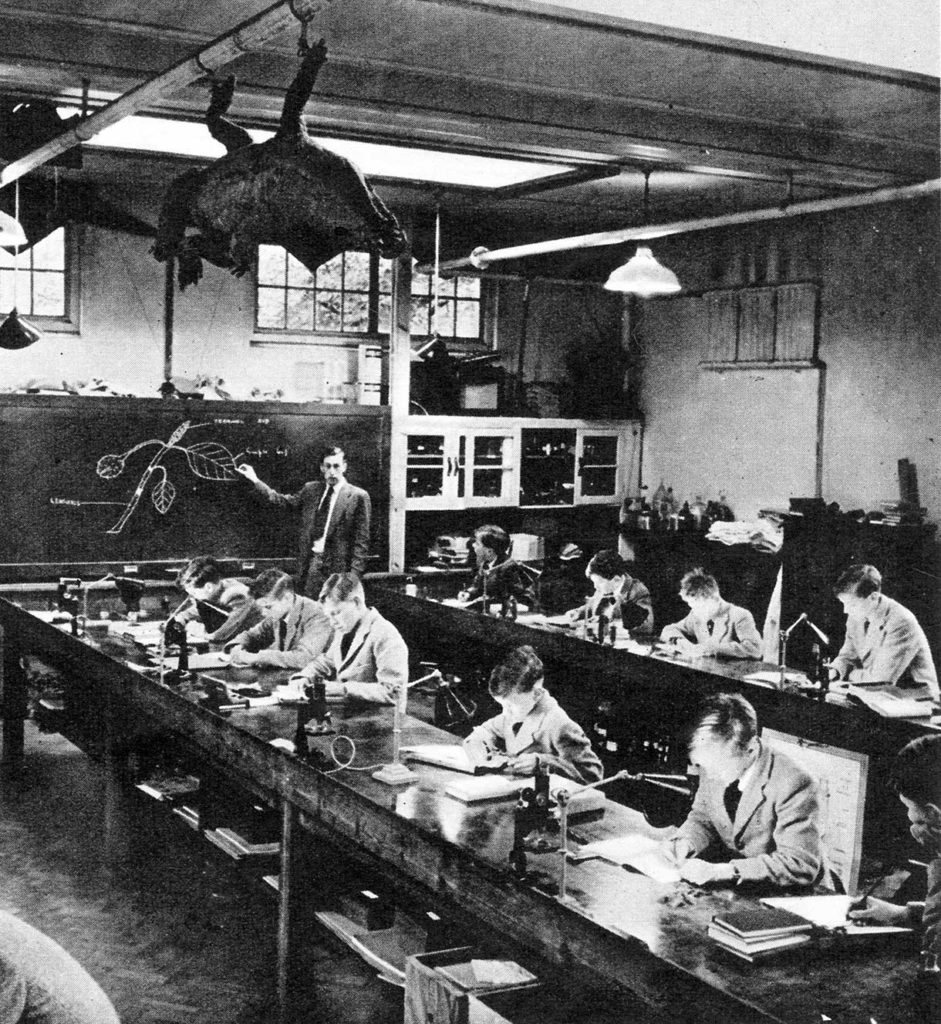
Biology
Wellingtonians of the 1940s will never have forgotten being taught Biology by A H Lewis, although, unfortunately, not for fond reasons:
‘Mr Lewis was extremely precise when it came to punishments. His lines had to be written on the sort of 4-lined paper given to children at the start of their schooling. It had a central pair of lines for the main part of letters, flanked by an upper and a lower line to contain the letters’ “risers” and “hangers.” Every letter had to touch the appropriate ruled lines exactly. Mr Lewis called his punishments “Big Stuff.”’ Peter Gardner (Hardinge 1946-51)
‘I remember little of his lessons other than the sheer terror with which he maintained discipline. His infamous punishment, meted out to the whole class for the infringement of his rules by a single boy, was known as “Coventry.” The whole class had to remain absolutely motionless for three minutes; the slightest flicker of movement from any one boy started the three minute period again from scratch. It all sounds innocent enough, but after ten minutes or so every inch of one’s body demanded to be scratched. Lewis’ Coventry was absolute torture…” Hugo White (Hardinge 1944-48)
‘A H Lewis used to teach “the birds and the bees” to large classes in the Science lecture hall. At the blinking of an eyelid one would be awarded “Big Stuff,” the making of the appropriate letters reach a line above or below. A taxing way of doing lines! I also remember his description of the sexes was that a woman was the fat nucleus while the men were the bees in orbit round her.’ ‘Bobby’ Baddeley (Picton 1948-52)
Mr Lewis was replaced by the much more pleasant Derek Angwin who, like most Biology teachers, also inherited the task of sex education:
‘I found most subjects hard until I moved to the science side, especially Biology under Mr Angwin who was an inspiring teacher.’ Norman Tyler (Hill 1947-52)
‘Derek Angwin was a younger teacher in the 1950s… He was stimulating and inspirational, and largely responsible for getting me into medicine. He earns my eternal thanks.’ Roger Ryall (Picton 1951-56)
‘One unfortunate master, Mr Angwin, had the task of teaching Biology for one term only to each boy. It started with amoebas and ended with how rabbits reproduced, the objective clearly being to provide sex education though never stated to be that; it being before 1963.’ Nick Harding (Combermere) 1951-1955
Nevertheless, students from both eras felt that their sex education was somewhat lacking:
‘Instruction in sex was a hit and miss affair, involving the younger boys in a confusing personal chat with the House Tutor plus what was to be gleaned obliquely in the Science Block from the biology classes of Mr Lewis.’ Alan Munro (Talbot 1948-53)
‘One lesson a week for a single term – moving from the amoeba to the human via the rabbit – in Biology. That is all the science (or sex education) I had at Wellington.’
Douglas Miller (Benson 1951-56)
Although one of our later respondents found that Biology offered him a slightly more practical experience:
‘When in the A Level years, several of us studying Biology were taken to Dale Fort in Pembrokeshire one year, and to Skokholm Island nearby the next year, where I carried out a project on limpets! There were girls of the same age there at Dale Fort too, so this was my only experience of co-education; with the girls we used to go for long walks well into the night (for which we were subsequently gently rebuked!)’ Christopher Birt (Beresford 1955-60)
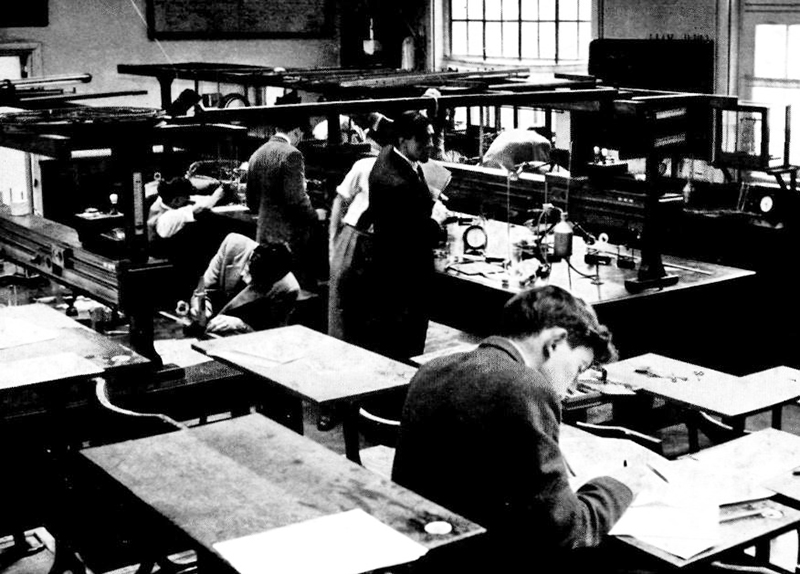
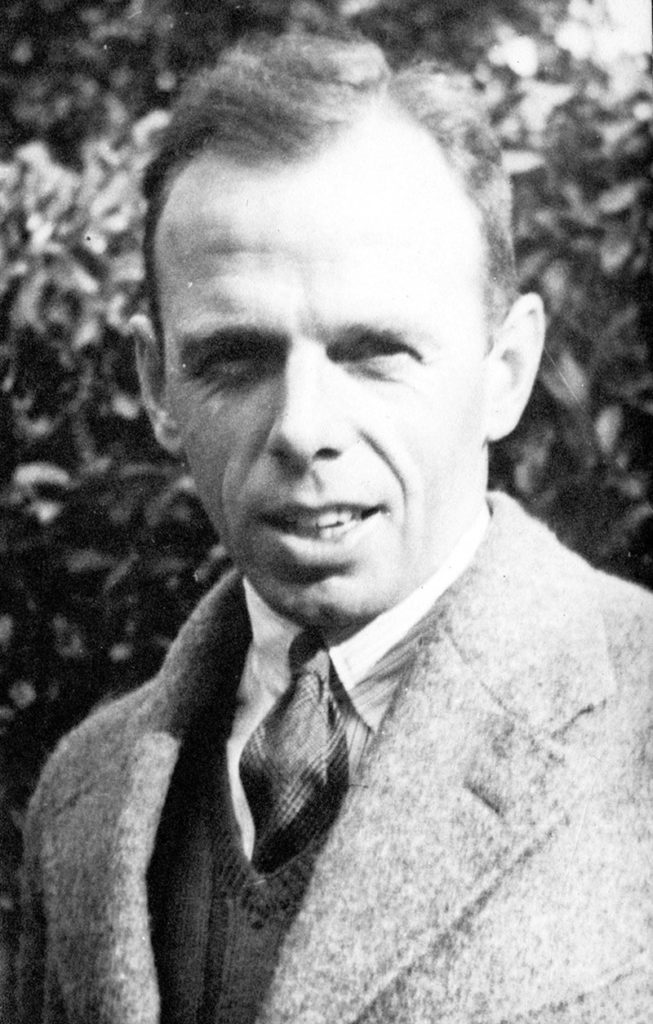
Geography
One of our oldest respondents, John de Grey (Blücher 1938-43), sent us this extract from a letter he wrote to his sister on 5th October 1940. His comment about ‘the last forty years’ is scarcely an exaggeration. Mr Stocken had joined the teaching staff in 1904:
‘We are having great fun with “Charlie” who takes us for Geography… For the last forty years he has always written the questions for the tests next day on the board and then goes home, locking the door behind him. All we have to do is go to the Porters’ Lodge and ask for the key for Mr Stocken’s classroom… We then march in and copy out the questions and answer them at our leisure before the hour begins next day. Another trick we play on him is to all start humming, very quietly at first, gradually getting louder and louder, and he can’t make out what is happening.’
The other Geography teacher recalled by several was Mr Leakey:
‘If I had to choose one, I would say that the most interesting subject was Geography taught by Mr. Leakey. He bought my stamp collection for five pounds!’ Chris Heath (Beresford 1948-53)
‘Mr. Leakey worked hard on me, and I did win the Elton Geography prize!’
Tim Travers (Hopetoun 1952-56)
Although perhaps he was not always remembered for his teaching skills:
‘Two members of Common Room who couldn’t stand each other were Meikle, a rugby international, and Leakey, a member of the famous Geography dynasty. There was tremendous excitement when they were paired together to administer the high jump. This entailed, rather obviously, having the cross bar set at the same height on each of the two uprights. “Up your side, Meikle.” “No, Leakey, it’s your side that’s too high.” “I beg to differ….” The whole school seemed to learn about the arguing that went on for most of the afternoon.’ Douglas Miller (Benson 1951-56)